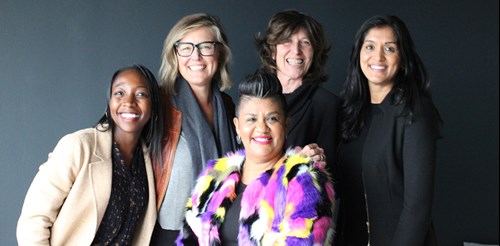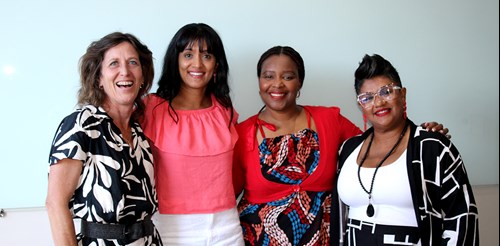Celebrating International Women's Day
Uniting for Change with Tracy Dawson and the Businesswomen of Africa Collective Capital
Filed under: Blog Articles

‘In the heart of Africa, united by a common purpose, we stand as The Collective. Our mission is rooted in the realisation of a continent’s potential – a continent with a rich tapestry of cultures, resources, and dreams. We pledge to bring this potential to life.’

A Dinner Party That Sparked a Movement
In May 2023, a dinner party was held in Cape Town, bringing together a dozen remarkable women from diverse sectors and backgrounds. The conversation was robust and stimulating, touching on topics such as market systems development, access to capital, and African and global geopolitics.
The dinner party was not just a social gathering; it was a catalyst for change. Inspired by the connections and conversations that took place that evening, we embraced the opportunity to create something truly extraordinary.
Our landscape survey showed a lot of promising activity around women’s empowerment, initially at least. Deeper examination exposed some more sobering truths.
Most women’s organisations on the continent (and there are many fine examples) are sector- focused, geographically or culturally exclusive.
In simple terms, there wasn’t a single organisation that would have welcomed every woman around the table that evening.
The Birth of BACC
Over the weeks and months following that dinner, we embarked on a journey of research and experimentation, including focus groups, pilots, and surveys, seeking to understand the needs and aspirations of women entrepreneurs in Africa.
We listened to their stories, their struggles, and their dreams, and began to envision a new kind of organisation - one that would empower women to achieve their full potential and create a more prosperous and equitable future for all.
And so, the Businesswomen of Africa Collective Capital was born. It’s not just a network or a platform; it’s a movement. A movement that will transform the lives of women entrepreneurs across the continent and beyond.
A movement that will redefine what it means to be a businesswoman in Africa.
A Seat at the Table
Around the table that first evening sat myself, and three other women who are now proud Directors of the Businesswomen of Africa Collective Capital.
We each bring a wealth of experience, expertise, and passion to the table, and I for one am thrilled to be leading this organisation alongside such a formidable group.
Gugu Ntuli, our President, is a former Group Executive: Corporate Affairs and Marketing of the South African Broadcasting Corporation (SABC). She has a wealth of experience in strategic marketing and communications, media relations, reputation, and brand management. Gugu is a visionary leader deeply committed to uniting and empowering business women across the continent.
Rayhana Sait Erasmus, our Director of Brand Strategy, is a strategic thinker with expertise spanning two decades in corporate, brand, and marketing. She has extensive experience in private markets and is passionate about empowering women and advancing gender equity in the business arena.
Latha Kalpee, our Director of Empowerment, has had a remarkable career spanning professional services, risk management, marketing, learning and development, NGOs, and Professional Bodies. She is passionate about empowering women and youth and is committed to advancing gender equity in the business world.

Our Mission
At the heart of BACC’s mission is a commitment to advocate for, empower, and advance the interests of African business women by creating opportunities for cross-border trade, access to finance, and capacity-building initiatives through a number of strategic objectives including;
● Bringing professional women and entrepreneurs across Africa onto a singular platform.
● Creating a vehicle that provides access to finance for women’s businesses.
● Providing access to African markets for women’s businesses.
● Building business skills capacity for African business women.
By providing access to finance, markets, and networks, BACC aims to empower women to realise their full potential, participate meaningfully in their economies and contribute to the prosperity of their communities.
As the BACC continues to grow and evolve, our team remain committed to their vision of a world where every woman has the opportunity to succeed. We know that the the journey ahead will be challenging, but are determined to make a difference and to be a part of something truly special.
Virtual Tea
One of our earliest, and most important recognitions was the reality of the demanding schedules of these influential leaders, and we sought a solution that was not only collaborative and meaningful but also effortless and flexible.
The answer lay in Virtual Tea sessions—three per week, every week, for just twenty-five minutes. These optional sessions were designed for easy access, devoid of any fuss, spam, or pressure, embodying the essence of inclusivity and accessibility.
Starting in September 2023, these sessions quickly became a cornerstone for collaboration, attracting a diverse group of women leaders keen on discussing change, empowerment, and strategic growth.
By October, shared values of safety, member growth, next-generation empowerment, African unity, and prosperity were established, guiding the collective's mission. The initiative saw rapid growth, expanding from nineteen participants to two hundred and seventy across twenty cities by February 2024!
This period of expansion continues and just this week we have received confirmation of the official incorporation of the Businesswomen’s Collective as a registered Non-Profit Company (NPC), marking a significant milestone in the development of what has already proved itself to be an empowering network for women entrepreneurs across Africa.
Strategic Projects
As we embark on our journey, BACC has identified several strategic projects and priorities to guide our work:
1. Women in Mining
African women work across the entire spectrum, from artisanal and small-scale mining (ASM) to large-scale mining (LSM) operations. Hugely underrepresented in the STEM disciplines (engineering, geology), and simply not as physically strong, it’s nonetheless distressing to know that up to 99% of women in mining in Africa are manual labourers in the ASM subsector, where they earn the lowest wages for the most menial work.
The solution is simple, replicable and scalable and will require collaboration across government, civic society, development and commercial finance institutions and communities. The ‘recipe’ is built around small-scale mechanisation, and enables women to participate meaningfully and productively in community-based artisanal mining initiatives.
2. Women and Energy
There is a critical need for clean cooking energy across Africa, particularly using LPG. Nearly 1.3 billion people in developing Asia and sub-Saharan Africa, especially in rural areas, lack access to electricity. Millions of households rely on traditional biomass (wood, charcoal) for cooking and heating. Four million premature deaths worldwide are attributed to resulting respiratory diseases and other health issues.
The last-mile distribution challenge for LPG is solvable and is essential for the empowerment of the continent’s women. With the modern tools, technologies and policy innovations that have taken root in Africa, it’s possible and imperative that women participate in the LPG value chain as retailers, distributors, or entrepreneurs. Empowering African women in clean cooking not only saves lives but also contributes to sustainable development, with measurable impact on climate, de- and reforestation, circular economies and community-level resilience and sustainability.
3. Women in Agriculture
Agroforestry, reforestation, reverse mining, and land rehabilitation opportunities are particularly suited to women. In partnership with Agroforestry and Climate Initiatives, we are designing a replicable model for community-led, profitable agroforestry businesses. Inclusion in the broader farm-to-fork value chain is an imperative which is supported by governments, corporates and INGO stakeholders.
Women constitute a significant portion of the agricultural workforce globally, and their contributions are vital for food production, nutrition, and household well-being. But traditional gender roles often limit women’s access to resources, land, and decision-making. Much of women’s agricultural work is unpaid or underpaid, and barriers to productivity is endemic.
These are three flagship programs which are already in design and operationalisation phase. In time, we expect that our members will drive us to participate more meaningfully and impactfully in STEM, Education, Health and Wellness, and a plethora of nuanced pan-African development initiatives which disproportionately impact women.
We believe that a better Africa is a better place for Africa’s women.
So today, as we observe International Women's Day, my journey with the Businesswomen of Africa Collective becomes a vivid illustration of what we can achieve through unity and collective action.
Our mission, deeply interwoven with the diverse cultures, resources, and dreams of Africa, mirrors the core values of this day—a global recognition of the strides women have made in social, economic, cultural, and political arenas.
BACC is our way of actively building a future where African businesswomen are empowered to reach their utmost potential.
On this International Women's Day, I am personally reminded of the incredible power of collaboration and the boundless opportunities that come to light when women come together, committed to driving forward change.




